Construction Project Management Processes to Run Every Project Successfully
Theodore M. Hesburgh, who became the president of the University of Notre Dame for thirty years, once said that leadership requires a vision—a steadfast goal for success. For leaders, having an objective helps organize the flow of activities, proposals, and plans. To achieve success, the leader works together with the team, combining forces and strategies. The same thing applies when starting a construction business.

Construction Project Management Processes to Run Every Project Successfully
Besides the usual insurance requirements, business plans, and marketing schemes, a leader, manager, or officer per se, is essential in making sure that all these objectives are achievable. Additionally, the role of construction project management is crucial for companies, and this article features excellent points to help the construction business with its management procedures.
Define Construction Project Management
In a simple definition, project management involves the planning, direction, and delivery of a particular plan or project. The goal of project management is the completion of the project or scheme. Towards the start of the 1950s, most enterprises applied the concept of project management in their business processes.
Construction project management is no different from the basic definition, with the exception that it’s solely focusing on construction activities and operations. Most project managers use project planning checklist to track the duties and to-dos in the project area. To protect both the owner and builder, the two parties also use construction project contracts. As a whole, construction project management is an integral part of the construction process of a project.
Principles of Construction Project Management
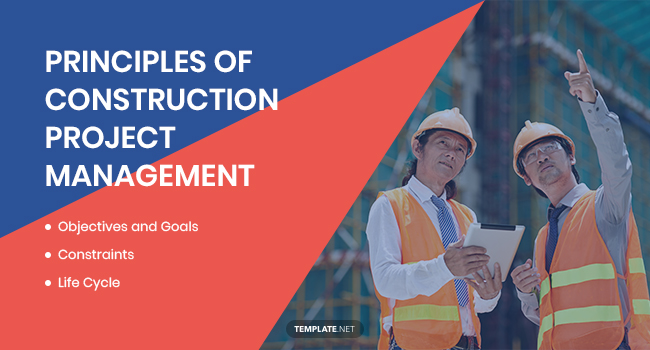
Project management handles the different deliverables of the plan. From the contract planning to the responsibilities of every employee, the project manager is in charge of making sure that everything is in order. A client that sets a standard time for the completion of a plan hires a construction project manager to organize the process of the work. The owner sets cost estimation in project management and creates a project management timeline to help the hired leader on the tasks at hand.
Objectives and Goals
Setting up a clear purpose benefits the owner of the project and the person-in-charge of the project. When the relay of details is in an appropriate order, there will be fewer errors. Budget planning is more efficient and effective when the goal is viable and reasonable. Furthermore, quality management plans become systematic with a definitive end-goal.
Constraints
Project management encounters four kinds of problems. First, there are legal constraints that come with the scope of work. Some regulations and work laws prevent the construction of the project. Second, the economic constraints that tackle the budget limits of the project. Third, the environmental constraints that include the public concern about the effect of the project on the surrounding area. Finally, social constraints involve the people and their apprehensions to the plans. To make amends, management releases project scope statements.
Life Cycle
The execution plan of a construction project has a life cycle. From the beginning stages of bidding to the project closeout, construction projects follow a pattern. Every project starts with bidding and the pre-construction processes, followed by the procurement and the construction of the establishment. When owner occupancy is possible, the life cycle of the project is nearing its end.
Construction Project Management Process
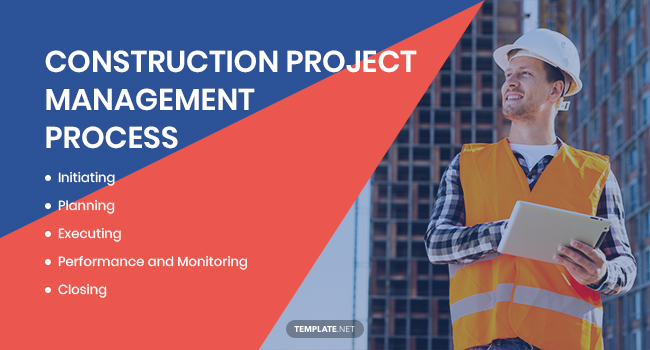
A project management process’ primary purpose is to organize the plans and activities of the construction company. These necessary steps help in ensuring the business that the project will become successful. The process includes project risk management plans to determine design pitfalls and create contingency plans. Additionally, the supervisors and managers make use of construction human resource management plans for the employment processes of the hired workers. The project management process undertakes various schedules meetings to consider the changes and adjustments that come with dealing with construction work. These project meeting minutes are essential for progress checking.
Initiating
The starting point of the project, initiating is where the project manager and stakeholders look at the feasibility of the project. They have to determine if the project is profitable and manageable by the construction company. Project managers also create evaluations and present these findings, together with other reports that justify the usefulness of the plan to the stakeholders. Most managers work with phase plan checklists to track the discussions.
Planning
Upon approval, a project team creates the project management plan (PMP), which will need the approval of the project manager. The plan becomes the road map that the team will follow to maximize time, resources, and efforts. The construction of materials schedule is part of the plans as it controls the inflow and outflow of funds. Thus, the project management planning mechanism establishes order and organization.
Executing
When there’s confirmation for the proposed project management plan, the work begins for the managers and employees. This time, the management plans start its implementation at the right stations and areas. Construction schedules will have updates every day, and budget worksheets should include the proper computations of the costs. During this time, the safety budget is always ready in case of emergencies.
Performance and Monitoring
All projects require progress reports, whether it’s on a daily, weekly, or monthly basis. With that, performance monitoring is a crucial part of project management. The officer-in-charge receives the reports from the different departments that handle the construction, and from that, the managers determine the needed change in the work status. Project management also measures the timeframe based on the pacing of the construction process.
Closing
As the final stage of construction, project leaders take time to assess the situation of the project. There will be a meeting set for the discussion of the project’s status, expense reports, project buy-out report, and evaluation. For unfinished tasks, the project team will create a punch list which the post-construction team will complete. The remaining duties will receive final verdicts from the project manager.
Stages of Project Management in Construction
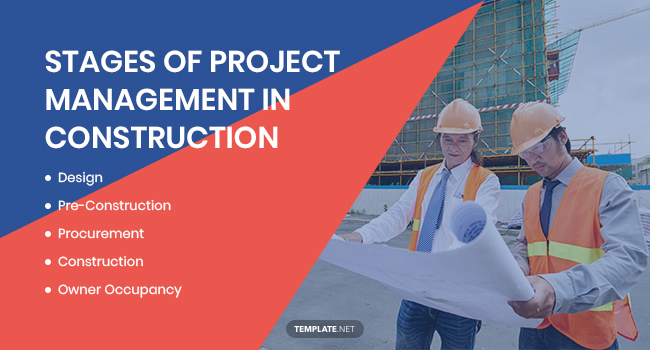
The construction of an establishment is not an easy feat. It demands time, funding, discipline, and patience—most notably, the leadership skills of the assigned officer or manager. But aside from these things, construction project management undergoes different stages to ensure clients and builders that there are no forms of biases and mismanagement going on. Moreover, it is impossible to jump from one stage to another without a proper transition. Understanding these steps or stages helps owners and contractors know where they should start or improve in their plans.
Design
Every construction project starts with the creation of the design phase plan. Different construction companies bid for the project with the submission of their proposals if the owner chooses open tendering. Engineers and architects can send their design ideas to the client. After the selection, the client, designer, and contractor can sign the design-builder and contractor agreement to seal the deal.
Pre-Construction
When the bidding process finishes and the client has the right people he or she needs for the project, they can all start planning for the pre-construction phase. There will be project managers, engineers, architects, and designers that will make sure the site(s) are ready for construction. The plans, permits, and the pre-construction services will have specific arrangements through the direction of the heads or officers.
Procurement
Once the site is ready, the project team begins to purchase orders for the required materials. From a bunch of large equipment to the smallest construction material, the team has to know that each item is present. Importantly, during this stage, the management hires the laborers and lays out the budget for the salaries and other expenses. The project team needs to allocate funds accordingly. With that, they make use of purchase order forms.
Construction
Before breaking ground, the project manager has to discuss the rules and restrictions of the construction. Doing this eliminates future difficulties that involve differences in personal beliefs and values. The project manager also states the work outline to inform the workers that a deadline is already set. The owner and construction manager agreement maps out the goals of the construction. Once the managers relayed instructions and plans, the building of the establishment can commence.
Owner Occupancy
After months of work, the construction is finally complete. Before the owner can occupy the area, the project team issues an assessment of the location to determine its capacity and standards. When resolved, an on-site manager and maintenance crew will keep the establishment up and running. For incomplete tasks, especially the little things, the assigned person can take care of the work. Through the owner and builder contract, all the loose ends will tie-up.
Roles and Responsibilities of A Project Manager in Construction
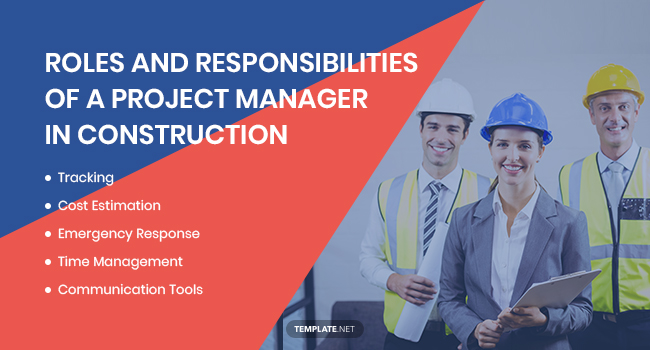
Besides preparing the documents, project managers also have different roles and responsibilities on the site.
- Tracking: The project manager keeps track of the staff meeting minutes to trace the allocation of resources to the construction sites. The progress reports should match the proposed dates and accomplishments of the project plan.
- Cost Estimation: Listing down the expenses and the labor costs is also the obligation of the project manager. After all, every little detail involving the project goes through him or her—even the material order forms to use for the procurement of extra supplies.
- Emergency Response: Including a quality control plan, project managers have to create risk management plans in case of a crisis in the construction site.
- Time Management: Project managers must maximize time and make every minute count. These plans have deadlines, and the managers utilize the time to get things done.
- Communication Tools: A harmonious working area boosts productivity and confidence. Therefore, project managers also have to find ways of better communication techniques to benefit all employees.
Budget for Construction Project Management
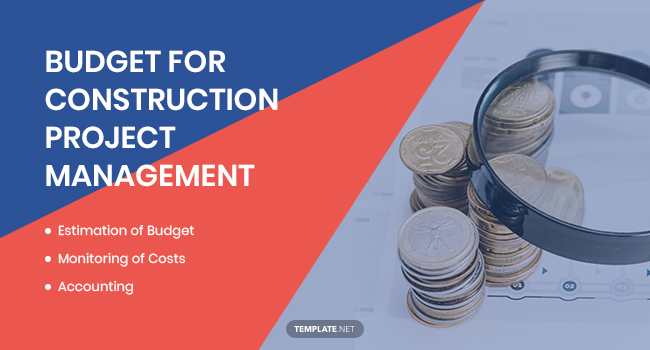
Preceding the start of the project, the people involved have to obtain the budget through the approval of the project investment proposals and plans. The contractor, together with the client and project management, have to discuss the result of the project cost analysis to determine the funding price. From the conclusion and adjustments, a time and material contract in project management can come collectively. A budget keeps the ball rolling in business, and for construction projects, the budget holds the process together.
Estimation of Budget
All projects have definite funding, as resources have limitations. So even before the commencement of the plan, contractors need to submit project cost estimates. Besides the estimates, cost tracking templates are essential tools for the project management team. Here are some costs that managers need to consider in the construction business.
- Labor Costs – This sums up the wages and benefits that each employee will receive while working in the project. Labor costs can either be direct or indirect.
- Material Costs – For construction projects, material costs consider all the readily identifiable materials used in building the establishment.
- Operating Costs – The cost of running the equipment and pieces of machinery not owned by the construction company falls under this section.
Monitoring of Costs
In monitoring the expenses of the project, the managers and his or her team use different tools. To determine whether the current spending allotment matches the expense budget, the project manager keeps a list of receipts and order forms. Also, the project team can include a marketing budget for the promotion of the property to the public.
Accounting
Accounting is the method of determining the value of the information and its relevance to the business—which in turn helps the people included in the decision-making process. For the construction business, accounting assigns funding for specific project parts. Most project management use expense account forms and monthly finance tracking templates when projects start.
Construction Project Scheduling Types
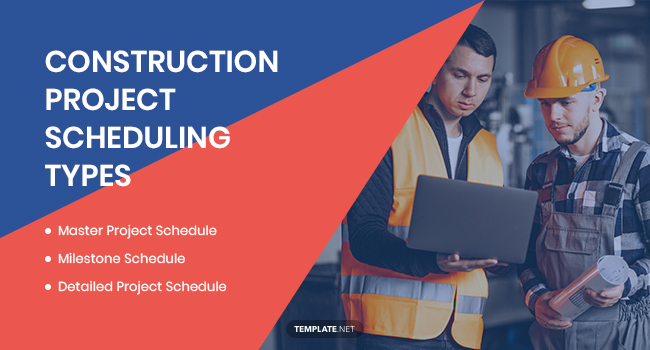
Construction projects take time to finish, and that’s disregarding the possible delays and dilemmas that the team might encounter. Despite the possibilities of interruptions, it’s always better to have a project schedule to follow. With a timeline of activities, everyone is aware of tasks to complete. Moreover, project scheduling is crucial when it comes to the transitions of the construction processes.
Master Project Schedule
Master project schedules, from the name itself, contain a summary of the primary tasks that the construction company needs to undertake for a particular timeframe. As an activity schedule, the mastery project schedule also includes the individual schedules of the in-charge and their obligations. The procurement schedule for the construction materials is also part of the document.
Milestone Schedule
Usually used as status report documents submitted to the owner or top-level management, milestone schedule holds the summary of all important events that will take place during the construction of the building. For instance, the completion of specific deliverables is a milestone for the construction team. Milestone schedules, as a look ahead schedule, is an annual schedule that businesses examine if the projects last for years.
Detailed Project Schedule
The detailed project schedule centers on providing sufficient details on the daily construction processes of the project—even hourly work schedule—for the convenience of the project managers, engineers, and designers. Most detailed project schedules have chapters and a rundown of each activity. Whether it’s a residential construction or commercial construction, a detailed project schedule is an effective tool to use.
Risk Management
Like every business, construction companies also consider the risks that come with the work. There’s no denying that the service has some safety issues, especially when the project involves skyscrapers, bridges, and other large systems. With that, every project has to pass the risk assessment checklist. The owner also conducts its construction risk analysis besides the results from the partner construction company. The risk management report should meet the requirements of both parties. After all, the security of those involved matters the most. Importantly, investments should reap the rewards and not the other way around. Therefore, risk management is crucial to guarantee the safety and compensation of businesses.
Conclusion
To grow your construction business, you have to consider new and better ways of handling project management. For one, you should acquire the right knowledge and techniques to assure clients that they are in good hands. Besides getting insurance requirements for the benefits of workers and the company, construction enterprises should showcase their reliability and competence. Being informed about construction cost estimating and reporting creates a difference in the image of the company, and it’s impressive. But most of all, construction companies should gain enough experience and skills, not to mention gathering essential details on ways to manage projects, to be above competitors.






